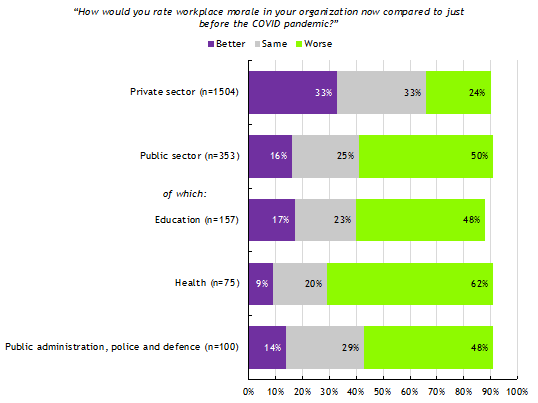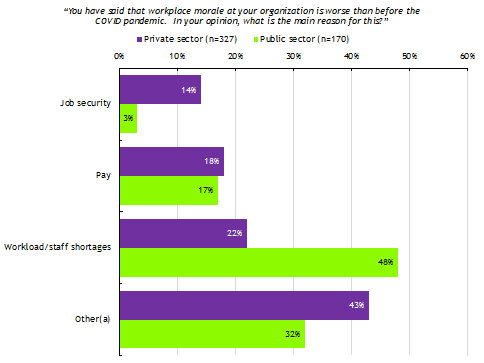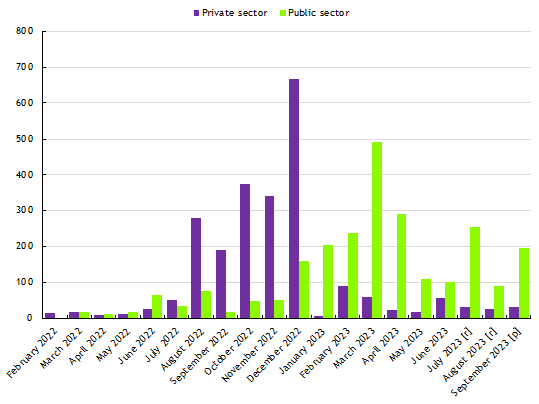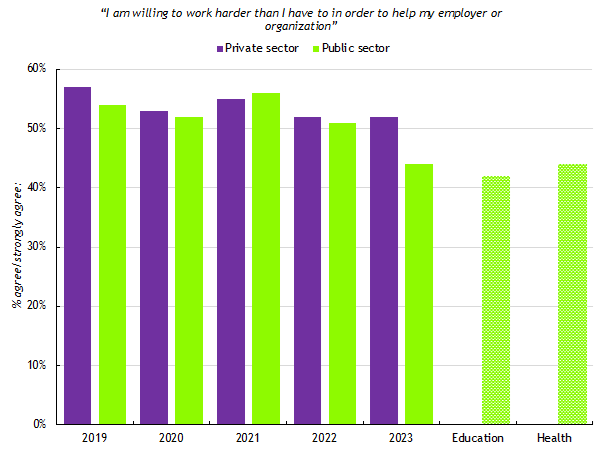Public services in the UK are not in great shape. According to the latest CIPFA/Institute for Government Performance Tracker, every single major public service is performing worse than before the pandemic.
This is despite government manifesto commitments to recruit more ‘front-line’ workers such as doctors, nurses and police officers. Cost-cutting and problems with staff retention mean that the latest Office for National Statistics (ONS) data show that public service productivity is still slightly below its pre-pandemic level. Earlier this year, the UK Chancellor announced an initiative to improve public sector productivity. Without improvement, current spending plans mean performance will get even worse.
According to the Institute for Government, one of the causes of these retention problems is declining staff morale. New data, collected as part of this autumn’s Labour Market Outlook, reveal the extent of the problem.
Survey respondents are usually the person in charge of HR/employment relations at their workplace. We asked them whether workplace morale was better or worse than before the pandemic (Figure 1).
Figure 1: Lower workplace morale is more common in the public sector (UK, workplaces with 2+ employees)

Note: Bars do not add to 100% because “don’t know” and “not applicable” responses are not reported.
Source: CIPD Labour Market Outlook – Autumn 2023.
In the private sector, about a third of organisations thought morale was better, another third thought it roughly the same, with just a quarter thinking it was worse (a tenth could not reach an opinion, mainly because the person answering the question had not been around pre-pandemic). In the public sector, however, half of employers thought morale was worse, rising to over three-fifths (62%) in healthcare (largely the NHS).
In those cases where morale had fallen, we also asked why this had happened (Figure 2).
Figure 2: Workload and staff shortages were a much more prevalent cause of declining morale in the public sector (UK, workplaces with 2+ employees)

Note: Includes other conditions (eg pensions); working hours/schedules; flexible working/hybrid working; senior leadership; office culture; management; “other”. Excludes “don’t know”.
Source: CIPD Labour Market Outlook – Autumn 2023.
Unsurprisingly, job security was rarely an issue in the public sector (this was a period when most of the public sector was trying to increase employment). More of an issue were staff shortages and the extra workload they often lead to. Although small cell sizes mean we don’t report precise figures, the proportion of cases where declining morale was thought to be due to workload and staff shortages was even higher in education and health than reported here.
In addition to employees voting with their feet, low morale has (at least) two other consequences. An all too visible one is industrial action (Figure 3).
Figure 3: Labour disputes in 2023 have been mainly in the public sector (UK, working days lost, thousands)

Source: Office for National Statistics.
So far during 2023, the number of working days lost due to stoppages in the public sector is almost six times more than days lost in the private sector. There are direct effects on public sector output (medical appointments postponed, schools closed etc) as well as knock-on effects on the private sector (such as more time off sick while waiting for treatment).
The second consequence of lower morale is less visible but possibly more important – lost employee goodwill. The data below are from the surveys used to compile the CIPD Good Work Index (Figure 4).
Figure 4: Employee goodwill has fallen sharply in the public sector (UK, excluding self-employed, owner-proprietors and partners in a business)

Source: CIPD/YouGov UK Working Lives Surveys.
From being roughly similar between private and public sectors, this measure of goodwill or willingness to ‘go the extra mile’ fell sharply in the public sector between 2022 and 2023.
Other data (not reported here) show that organisational commitment in the public sector remains strong. Evidently, something increasingly prevents public sector employees from turning this into willingness to supply additional, discretionary effort. This could be caused by any (or all) of poor management and leadership, unmanageable work pressures or dissatisfaction with pay or other conditions.
The impact of lost staff goodwill on public sector productivity is difficult to quantify, but could be profound. It could be reflected in increased backlogs, increased quitting, higher staff absence, or less tolerance for sub-standard working conditions (or indeed, all of these).
The Chancellor’s Autumn Statement speech had little to say on public service productivity, possibly because the junior minister who had been leading on this was sent to the Cabinet Office the week before. The more detailed documentation contained warm words but no further commitments beyond the intention to reduce the number of civil servants to its pre-pandemic level.
Cheeseparing of this kind did produce modest productivity gains over the period 2010–19, but arguably at the cost of long-term improvements (producing a demoralised workforce working with an increasingly tatty capital stock).
The UK Government’s spending plans thus assume productivity increases without specifying how these will be achieved. This conundrum has now been dumped in the lap of the Chief Secretary to the Treasury who will run “an ambitious public sector productivity programme”.
Topics A-Z
Browse our A–Z catalogue of information, guidance and resources covering all aspects of people practice.
Bullying
and harassment
Discover our practice guidance and recommendations to tackle bullying and harassment in the workplace.
About the author

Mark Beatson, Senior Labour Market Analyst
Mark's respected labour market analysis and commentary strengthens the CIPD’s ability to lead thinking and influence policy making across the whole spectrum of people management and workplace issues.
Prior to joining the CIPD, Mark was an economic consultant and for over 20 years worked as an economist in the Civil Service, latterly at Chief Economist/Director level, in a range of Government departments including the Department for Business Innovation and Skills (BIS), the Department for Innovation, Universities and Skills (DIUS), the Department of Trade and Industry (DTI) and HM Treasury.

Read our submission to the UK’s Chancellor, ahead of the March 2024 budget statement

Evaluating the pros and cons of working in shared office spaces, and how they impact on productivity

Peter Cheese, the CIPD's chief executive, looks at the challenges and opportunities faced by today’s business leaders and the strategic priorities needed to drive future success

We outline the key pieces of legislation set to come into force in the UK and explain their implications for employers and employees

We examine people’s desired hours and how this compares to the hours they actually work

Employers’ reactions to pension proposal highlight concerns over cost, while the CIPD calls for focus on raising pension awareness among staff, the need for higher contributions and better understanding of value for money

